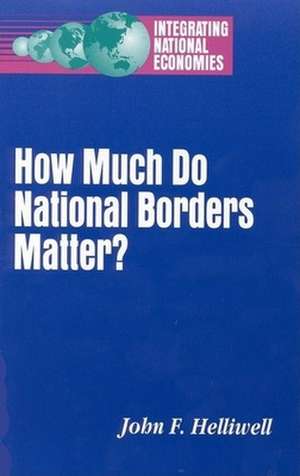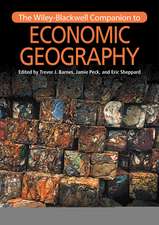How Much Do National Borders Matter?
Autor John F. Helliwellen Limba Engleză Paperback – iul 1998
It is widely believed that globalization has proceeded to the point where international economic linkages are as strong as those within nations. Struck by research suggesting that this perception is dramatically mistaken, John Helliwell spent three years assessing the evidence. The results are reported in this book, the latest in Brookings' Integrating National Economies series. It provides the most systematic measurements yet available of the relative importance of global and national economic ties.
The original finding, based on a gravity model of trade flows, was that 1988 trade linkages between Canadian provinces were twenty times as dense as those between Canadian provinces and U.S. states of similar size and distance. A much longer and more detailed body of data is used to expand and explain these findings. Data for trade within and among OECD and some developing countries are used to show that the Canadian-U.S. results are applicable to other countries. Helliwell then surveys and extends the evidence relating to price linkages, capital mobility, migration, and knowledge spillovers, finding in all cases very large border effects.
The evidence offers a challenge to economists, policymakers, and citizens to explain why national economies have so much staying power, and to consider whether this is a good or bad thing. Helliwell argues that since large and small industrial economies have similar levels of income, there are likely to be diminishing returns from increases in globalization beyond levels sufficient to permit the ready exploitation of comparative advantages in trade, and relatively easy access to knowledge developed elsewhere.
The original finding, based on a gravity model of trade flows, was that 1988 trade linkages between Canadian provinces were twenty times as dense as those between Canadian provinces and U.S. states of similar size and distance. A much longer and more detailed body of data is used to expand and explain these findings. Data for trade within and among OECD and some developing countries are used to show that the Canadian-U.S. results are applicable to other countries. Helliwell then surveys and extends the evidence relating to price linkages, capital mobility, migration, and knowledge spillovers, finding in all cases very large border effects.
The evidence offers a challenge to economists, policymakers, and citizens to explain why national economies have so much staying power, and to consider whether this is a good or bad thing. Helliwell argues that since large and small industrial economies have similar levels of income, there are likely to be diminishing returns from increases in globalization beyond levels sufficient to permit the ready exploitation of comparative advantages in trade, and relatively easy access to knowledge developed elsewhere.
Preț: 180.87 lei
Nou
Puncte Express: 271
Preț estimativ în valută:
34.61€ • 36.13$ • 28.64£
34.61€ • 36.13$ • 28.64£
Carte tipărită la comandă
Livrare economică 04-18 aprilie
Preluare comenzi: 021 569.72.76
Specificații
ISBN-13: 9780815735533
ISBN-10: 0815735537
Pagini: 184
Dimensiuni: 152 x 229 x 12 mm
Greutate: 0.26 kg
Ediția:New.
Editura: Brookings Institution Press
Colecția Brookings Institution Press
ISBN-10: 0815735537
Pagini: 184
Dimensiuni: 152 x 229 x 12 mm
Greutate: 0.26 kg
Ediția:New.
Editura: Brookings Institution Press
Colecția Brookings Institution Press
Notă biografică
John F. Helliwell is professor of economics at the University of British Columbia. He has participated in several Brookings studies of international interdependence.
Descriere
It is widely believed that globalization has proceeded to the point where international economic linkages are as strong as those within nations. Struck by research suggesting that this perception is dramatically mistaken, John Helliwell spent three years assessing the evidence. The results are reported in this book, the latest in Brookings' Integrating National Economies series. It provides the most systematic measurements yet available of the relative importance of global and national economic ties.
The original finding, based on a gravity model of trade flows, was that 1988 trade linkages between Canadian provinces were twenty times as dense as those between Canadian provinces and U.S. states of similar size and distance. A much longer and more detailed body of data is used to expand and explain these findings. Data for trade within and among OECD and some developing countries are used to show that the Canadian-U.S. results are applicable to other countries. Helliwell then surveys and extends the evidence relating to price linkages, capital mobility, migration, and knowledge spillovers, finding in all cases very large border effects.
The evidence offers a challenge to economists, policymakers, and citizens to explain why national economies have so much staying power, and to consider whether this is a good or bad thing. Helliwell argues that since large and small industrial economies have similar levels of income, there are likely to be diminishing returns from increases in globalization beyond levels sufficient to permit the ready exploitation of comparative advantages in trade, and relatively easy access to knowledge developed elsewhere.
The original finding, based on a gravity model of trade flows, was that 1988 trade linkages between Canadian provinces were twenty times as dense as those between Canadian provinces and U.S. states of similar size and distance. A much longer and more detailed body of data is used to expand and explain these findings. Data for trade within and among OECD and some developing countries are used to show that the Canadian-U.S. results are applicable to other countries. Helliwell then surveys and extends the evidence relating to price linkages, capital mobility, migration, and knowledge spillovers, finding in all cases very large border effects.
The evidence offers a challenge to economists, policymakers, and citizens to explain why national economies have so much staying power, and to consider whether this is a good or bad thing. Helliwell argues that since large and small industrial economies have similar levels of income, there are likely to be diminishing returns from increases in globalization beyond levels sufficient to permit the ready exploitation of comparative advantages in trade, and relatively easy access to knowledge developed elsewhere.











